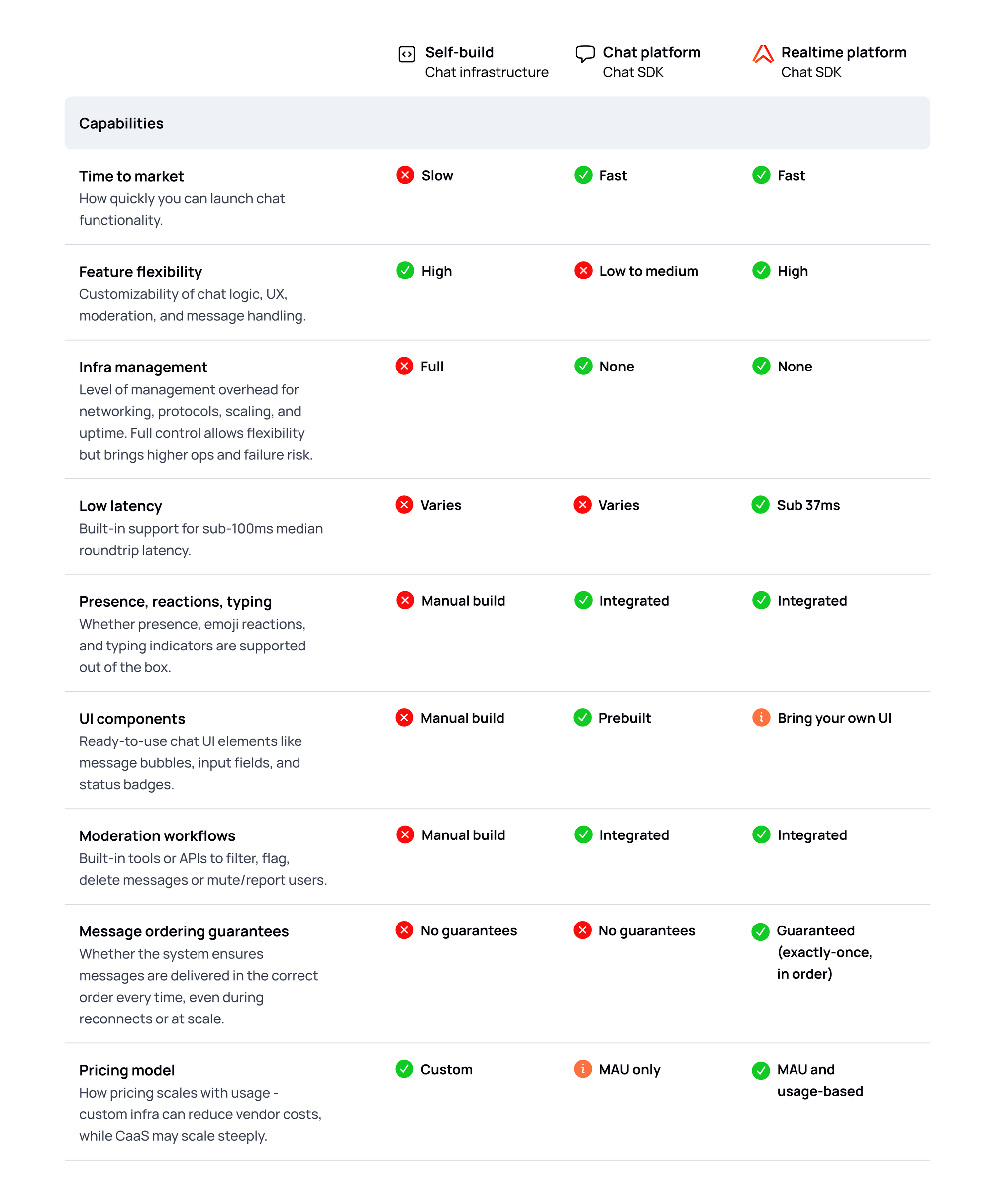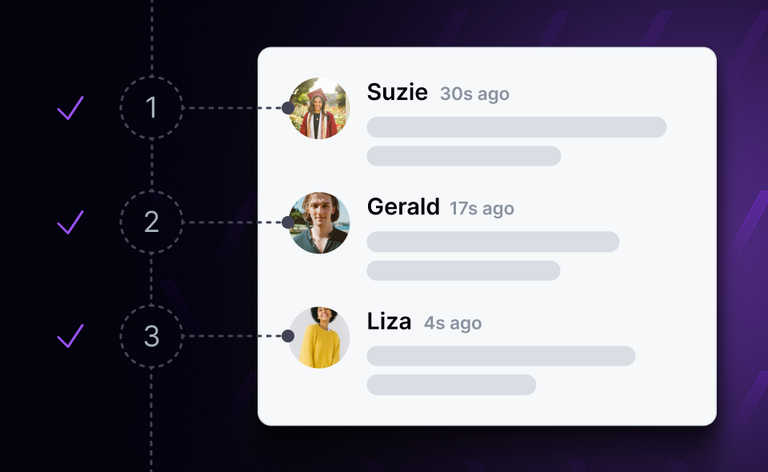Deciding between building or buying a live chat solution? This post helps you evaluate whether to build in-house, adopt a Chat-as-a-Service (CaaS), or use a realtime platform with a chat SDK like Ably Chat. It covers pros and cons of each approach across speed, control, cost, and scalability.
Live chat has evolved from a nice-to-have feature to an essential component for customer service, user engagement, and community interaction across gaming, SaaS, social networks, and live-streaming apps. As realtime communication becomes increasingly integral, it touches nearly every layer of your stack, from low-latency message delivery and message ordering to presence indicators, moderation, and scaling at global levels.
In fact, the importance of live chat cannot be overstated, with studies showing:
- 41% of customers prefer live chat over phone support.
- 52% of customers would buy again from a company that offers live chat.
- 79% of businesses report increased customer loyalty and sales after implementing live chat.
But with these opportunities comes complexity. Building chat isn’t “just another feature” - it’s a strategic decision that affects your app’s infrastructure, user experience, and long-term scalability. That’s why choosing the right architecture upfront is critical.
The Three Ways to Implement Chat
When choosing the right approach to chat, there are three common routes, each with its advantages and trade-offs:
- Build your own chat backend from scratch
- Use a chat SDK or Chat-as-a-Service (CaaS) provider
- Leverage a realtime platform with a purpose-built chat SDK (like Ably Chat)
Want a deeper look at the technical architecture behind realtime chat? Read our guide on designing chat architecture for reliable message ordering.
Building your own chat backend from scratch
Building a live chat system from scratch gives you full control over every layer of the architecture. If your team has strong expertise in realtime and distributed systems, this might seem appealing. You get to tailor protocols, storage, and even the user experience (UX) to your exact needs.
However, this approach comes with significant challenges. The reality is that building and maintaining a custom solution is a complex and resource-intensive task. First their are the technology choices. Do you rely on a messaging protocol, such as WebSockets, MQTT, WebRTC, and XMPP or, instead, pull in a realtime library such as Socket.IO? Beyond the initial build, you’ll need to account for scaling globally, low latency delivery, message ordering, and uptime. Also, the deeper you go into realtime chat infrastructure, the more specialized the requirements become.
The pros of building a live chat system from scratch
The upsides of building your live chat system in-house mostly center on control and flexibility:
- Total control: Building in-house allows you to specify the solution that precisely meets your requirements. And if you have the engineering expertise and capacity to deliver it, you can take both the product and technical decisions to deliver the functionality you need.
- Choice of tech stack: With all of the choice on offer, including open source libraries and cloud based infrastructure, you can select the tooling that meets both your budget and your development team’s preferences.
- Potentially lower costs: Depending on the technology choices you make, you could save money on annual licensing fees needed to buy in a solution, with the trade-off that upfront engineering and ongoing infrastructure costs are likely to be higher.
Already deep in the weeds of infrastructure? Our scalable chat app architecture guide covers what to plan for from day one.
The cons of building a live chat system from scratch
While the advantages of building a live chat system from scratch are evident, there are some challenges to consider:
- Build cost is usually higher than expected: The upfront cost of building an in-house solution, combined with ongoing maintenance and infrastructure expenses, often lead to a higher total cost of ownership than buying an existing system. Our research for the State of Serverless Websocket Infrastructure report shows that 69% of similar projects take at least three months to build and 93% require four or more engineers.
- Long term maintenance costs outstrip savings potential: Half of all self-built realtime data platforms cost $100K-$200K a year in maintenance costs, according to respondents of our State of Serverless Websocket Infrastructure report survey.
- Live chat is complex: Building realtime systems is specialized work that can seem deceptively straightforward to teams who have not tackled it previously. That makes it easy to underestimate the resources required. More than half of realtime projects cost more and take longer to build than planned.
- Responding to changing needs is hard: Not only is the up-front engineering work costly and often hard to forecast, so is adapting functionality to changing needs. In particular, live chat can be a route into realtime functionality for many organizations and the scope of business requirements can quickly expand to other use cases such as live video streaming, app state synchronization, data transfers, and more. Realtime systems are complex, involving many moving parts each with low tolerances for failure. Expanding a purpose built live chat system for more general realtime use cases could require substantial re-engineering.
Best for: Teams with dedicated infra/ops expertise, high custom requirements, and deep pockets.
Use a Chat-as-a-Service (CaaS)
If speed is your priority, a chat SDK or CaaS (Chat-as-a-Service) platform can help you get up and running quickly. These platforms - like Stream, Sendbird, or Twilio - offer prebuilt components like messaging, presence, and reactions. They handle all the infrastructure, scaling, and operations.
However, the trade-off comes with a lack of flexibility. You’ll be limited by the platform’s constraints on custom chat logic, UI design, and integration options. This could be fine for basic needs but may fall short when you need more control over user experience or the ability to extend beyond chat.
The pros of using a CaaS
The advantages of using a CaaS are pretty straightforward:
- Minimal engineering effort: Implementing a chat-as-a-service tool is relatively easy, usually relying on pre-built widgets or simple integrations with an API.
- Quick time to market: As a ready-made solution, a CaaS can give your app live chat features with a relatively short lead time.
- Low maintenance and roadmap investment: The CaaS provider takes care of keeping the service online as well as delivering new functionality.
- Low maintenance and roadmap investment: The CaaS provider takes care of keeping the service online as well as delivering new functionality.
The cons of using a CaaS
On the other hand, chat-as-a-service can be quite limiting.
- Little to no control over features: The solution you can implement is decided by the functionality provided by the CaaS vendor, which might not match your users’ needs.
- Fees can mount up: As an end to end solution, CaaS products come with higher ongoing licensing costs and are likely to increase as your user base grows.
- Quality of service may be restricted: A chat-as-a-service provider’s focus may be on customers whose QoS expectations are lower than yours.
- Limited integrations: The scope for working with data and functionality in your existing suite of tools will be limited according to what the CaaS vendor has enabled.
- Only offers chat: As a specialized tool, CaaS offers chat functionality only and would require you to buy in other tools should you want to deliver other realtime features, such as multiplayer collaboration or data broadcast.
Best for: Teams needing chat-only functionality, with limited customization needs.
Use a Realtime Platform with a chat SDK (e.g., Ably Chat)
There is a third option that strikes a balance between control and speed. By leveraging a realtime platform with a purpose-built chat SDK, you can tap into a provider’s realtime expertise and infrastructure, while still customizing the chat solution to fit your exact requirements.
A realtime platform like Ably, with its Chat SDK, offers the best of both worlds: it’s quick to implement while giving you ample flexibility to tailor the user experience.
The pros of using a realtime platform
This approach offers a balance of quick implementation and customization, making it ideal for teams that need both flexibility and efficiency.
- Quick to implement with customization options: A realtime platform with a chat SDK lets you get your chat solution up and running quickly, while still allowing for extensive customization to meet your specific needs. You don’t have to sacrifice speed for flexibility.
- Global infrastructure for low latency and scalability: Backed by a global pub/sub infrastructure, this platform ensures low-latency messaging, seamless scalability, and reliable performance even as your app grows, allowing you to deliver a smooth real-time experience at any scale.
- Comprehensive chat features, including presence, reactions, and message history: The platform comes with essential chat features such as presence management, message history, typing indicators, and reactions, all pre-built for ease of use and enhanced user interaction.
- Supports a wide range of chat types: Whether you need 1:1 messaging, group chats, or even livestream-style communication, the platform’s flexible architecture supports various chat configurations, making it easy to tailor the experience for different use cases.
- Easy integration and built-in moderation tools: The platform integrates seamlessly with your existing tech stack and provides built-in tools for moderation and UI customizations, helping you enforce policies and design a chat interface that aligns with your brand and compliance requirements.
- Predictable pricing models to grow with your app: With usage-based or MAU pricing, the platform offers predictable costs that scale with your app, ensuring you can plan for growth without surprises.
Cons:
While this solution offers flexibility, there are a few considerations to keep in mind.
- Requires front-end UI development: Unlike some solutions with pre-built UIs, this platform requires you to design and develop the front-end chat interface, offering flexibility but requiring more time and resources to build and integrate.
- More setup compared to CaaS, but less infrastructure burden than self-building: Setting up the platform requires more effort than using a CaaS solution, but it’s far less complex than building everything from scratch. The platform takes care of the infrastructure, so you can focus on your app’s features instead of managing backend systems.
Best for: Teams looking for reliable realtime infrastructure with chat primitives, but without the burden of maintaining backend systems.
Requirements for a successful live chat
Regardless of whether you build your own live chat app in house or you rely on a CaaS or realtime platform, there are certain foundational elements that you’ll need to deliver in order to create a successful experience.
WhatsApp and Facebook Messenger, amongst others, have set the bar for what end users expect from live chat. When building your live chat you’ll need to meet those expectations by delivering on these foundational features.
- Low latency: Realtime chat sets a baseline of interactivity that can only be realized when there is minimal delay between a message being sent and then received by other participants. That depends on using low latency protocols, such as WebSockets, and having a global network of servers that are geographically close to end users.
- Guaranteed delivery: Each message must get to its destination in the correct order and on time. Even at smaller scales, that requires significant engineering effort to deliver reliably and without the possibility of confusion caused by missed, duplicated, or unexpected messages.
- Scalability: Increased uptake of your live chat should be reason to celebrate, rather than causing concern over how to serve the expanded user base. A Pub/Sub messaging architecture separates communication and business logic, providing the basis you need to scale on demand.
- Elasticity: High performing, resource efficient, chat applications maintain a consistent user experience regardless of usage patterns and traffic spikes. They automatically react to changes in demand, elastically scaling to handle unpredictable and fluctuating numbers of concurrent users.
- Reliability: Live chat must be available around the clock. As well as elasticity, this requires built-in redundancy to enable the system to route around outages and network issues.
- Key features: To meet user expectations for live chat, you'll need basic features like authentication, allowing users to log in and assume roles (e.g., seller, buyer). Users will also expect easy access to contacts and message history for ongoing conversations. Beyond that, enabling message editing, deletion, and user tagging is essential. Integrating native notifications ensures participants stay informed, even when not actively engaged in the chat. For more on the features needed for live chat, see our ultimate list (complete with examples).
- Integrations: Your live chat solution should seamlessly integrate with the other tools in your tech-stack, otherwise you risk substantial engineering requirements in order to integrate new services into your infrastructure.
- Data governance: How data is gathered, stored, processed, and disposed of. Data policies also set out who can access what kinds of data and what kinds of data are under governance.
- Chat moderation: The process of monitoring and controlling user-generated messages and content. To meet trust and safety commitments around chat, integrated moderation is essential to ensure all user-generated content is in compliance with your terms of use.
- Frontend UI: Ready-made UI design theme components, such as colors and fonts, which can be customized to suit your brand. This enables an easy and fast integration of standard chat features into new or existing client apps.
Chat Architecture Options Compared
To help you make an informed decision, here’s a visual comparison of the trade-offs across the three approaches - self-build, chat SDK/CaaS, and realtime platforms with chat SDKs - covering factors like speed to market, feature flexibility, scalability, and cost.

Making the Decision: Which chat option best fits your team?
Based on the comparison in the tables, here's how to decide which option is best suited to your needs:
- Self-Build: Best for teams with strong infrastructure expertise that require complete control over every aspect of their chat solution. This option is ideal for highly customized use cases, but it requires substantial resources, including dedicated engineering teams and significant ongoing maintenance.
- Chat SDK / CaaS: Ideal for teams with limited engineering resources that need to deploy a chat solution quickly. While this option offers great speed to market, you might sacrifice flexibility, and scalability can become an issue as your app grows. It's best for companies looking for chat-only functionality without the need for advanced features like scalability or custom integrations.
- Realtime Platform with Chat SDK (e.g., Ably Chat): A great middle ground for teams that want fast setup, customization, and scalability without the burden of managing infrastructure. Ably’s Chat SDK allows you to quickly implement real-time messaging with rich features while having the flexibility to integrate with other real-time use cases. It’s ideal for teams that want a flexible, scalable, and reliable solution without the need for in-house infrastructure management.
FAQs
- What is the best way to build a chat app? It depends on your goals. Self-build offers control, Chat platforms offer speed, and realtime platforms like Ably and our Chat product offer both flexibility and reliability.
- When should I use a chat SDK? Use a Chat SDK when speed to market is more important than full customization.
- What’s the difference between a chat platform and a realtime platform? A chat platform offers prebuilt messaging features and is limited to chat use cases. A realtime platform like Ably provides the underlying infrastructure and chat primitives, giving more control and scalability - applicable to a wide range of realtime use cases.
- Is building a chat backend worth it? Only if you have the time, budget, and need for total control. Building a decent chat architecture from scratch is relatively easy, but building a rock-solid one is an ongoing investment. For most teams, it’s faster and cheaper to build on top of a platform that handles the hard parts of realtime delivery.
Get started with live chat from Ably
Ably’s Chat SDK provides a flexible, feature-rich system for building 1:1, group chat, and even livestream-style interactions. It comes with built-in tools like presence management, message history, reactions, and typing indicators, all supported by Ably’s global pub/sub infrastructure. You also benefit from integrated moderation workflows (with tools like Hive), automatic scaling, and predictable pricing (either MAU or usage-based pricing), ensuring that costs remain manageable as your app grows.Start with a free developer account and begin building today.





